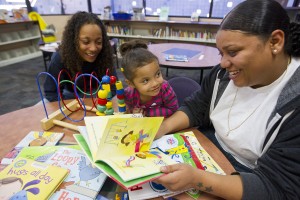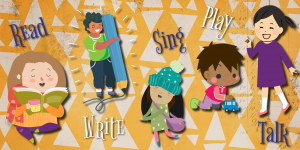Reading with young kids helps them develop literacy and get prepared for school.

There are so many advantages reading can bring to us -- to destress, to learn knowledge, to communicate ideas, etc. Reading is a skill that we all start at a very early age (intentionally or unintentionally) and develop during our whole life.
If kids are well prepared in the process of learning to read, they will be more prepared for reading to learn when they are in school. If they are unprepared and struggle with reading, they’ll struggle with learning.
But at the very beginning, sharing books with young children is to have fun together. There’re many ways they can experience, explore and develop the love for reading.
Babies
- Help them explore their world by naming and showing things, talking about what you're doing, like making dinner or going for a walk. This will help them build connections when they start to read later.
- Repetition is very necessary to get babies ready to read. During repetition, their brain neurons are reactivated and strengthened.
- Use board books with simple illustrations to help your child learn that pictures and words are symbols that can be interpreted:
Find board books for babies in our catalog
Toddlers
- Expose your child to new words, thereby increasing their vocabulary.
- Familiarize your child with the conventions of print. Title, author, page turning, print from top to bottom, from left to right etc.
- It’s okay if your toddler doesn’t want to sit still as you read. They can run and play as you read an exciting story while they listen to it. Maybe they will act it out!
Preschoolers
- Choose books which can challenge them but not frustrate them. It’s ok if they don’t know all the words in the book. But if they don’t know more than 5 words on the same page, they can get frustrated and lose interest.
- Make bedtime reading routine early on, and continue encouraging it. Numerous studies have shown that reading can get brains ready for sleep while screen time does the opposite.
- Before going on outings or trips, try to find books to fit the theme. For example, if you’re going to the zoo, get books about animals. When your child reads a story about a giraffe, then sees one in person, they may want to read more about it afterward.
References
- Early Literacy: Why Reading is Important to a Child’s Development
- Zero to Three - Early Literacy
- Read Together to Support Early Literacy
-Xuan, Children's Librarian, Joel D. Valdez Main Library
 Read, Write, Talk, Sing, Play!
Read, Write, Talk, Sing, Play!
Reading helps children understand how text works and positions them to increase their language and literacy skills throughout their lives.
Read more about early literacy and how you can make a difference in your child's life.


